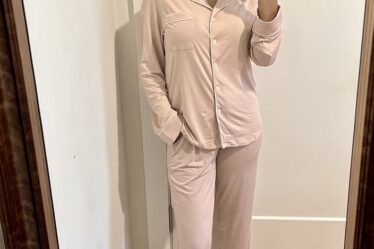Wondering how to stop sweating so much? You’re not alone, even if excessive perspiration—and common side effects like night sweats, body acne, and thigh chafing—make you feel isolated.
I know because I’ve dealt with my fair share of unwanted sweat: I can’t wear foundation in the heat without setting powder and spray (and sometimes it’s still lucky if makeup stays on), and live and swear by anti-chafing creams (more on these below).
Furthermore, hyperhidrosis, which is the medical term for excessive sweating unrelated to heat, exercise, anxiety, or stress, affects about 15 million people daily in the U.S. Even without a hyperhidrosis diagnosis, sweating over all is a perfectly natural—and healthy—bodily function, and some people simply experience more of it than others, like me on my morning commute.
So if you’re anything like me, and perpetually wiping your face and back (and wherever else) after walking outdoors for extended periods of time, here’s how I—and dermatologists—deal with excess sweat.
Why am I sweating so much?
First, let’s address why some people seem to sweat more than others. “Sweat is a normal reaction by our body to excrete toxins and regulate optimal body temperature in situations such as high heat, intense exercising, or acute stress,” board-certified cosmetic dermatologist Michele Green, MD, tells Glamour, reiterating that sometimes, this reaction is simply stronger in certain individuals. “The sweat glands are signaled to turn off once the body is removed from the situation. This signal never occurs for some individuals, and the sweat glands continue to produce sweat.”
As for why that is? “People sweat at different rates due to a combination of genetic factors and environmental influences,” says Jody Alpert Levine, MD, board-certified dermatologist and director of dermatology at Plastic Surgery & Dermatology of NYC. “The number of sweat glands, their activity, and the response to stimuli can vary among individuals. Some people may have a higher number of sweat glands or more active glands, leading to increased sweating.”
Other factors can play a role too, such as an overactive thyroid, anxiety, a genetic predisposition, neurological conditions, and medication side effects, adds Dr. Green. So no: it’s not that you personally are doing anything wrong (except maybe sitting outside in the sun for too long).
When to see a doctor for sweating
All of that said, there are signs for when it’s time to see a doctor for sweating. “If someone is experiencing excessive sweating that significantly affects their quality of life or if over-the-counter products have not been effective, they should consult a board-certified dermatologist,” says Dr. Levine. “Signs that indicate a need for prescription-strength products include severe sweating that interferes with daily activities, no improvement with over-the-counter solutions, or excessive sweating during sleep.”
A dermatologist can assess the severity of the sweating and recommend appropriate treatments, Dr. Levine adds, which may include prescription-strength antiperspirants or other therapies (which are discussed in depth below).
How to Stop Sweating so Much
While it’s never someone’s fault that they’re sweating per se, there are a handful of lifestyle changes, over-the-counter products, and in-office treatments and procedures that can help alleviate excessive sweating, ranging from moisture-wicking fabric to Botox for sweat.
Wear Light Colors & Moisture-Wicking Clothing
In terms of lifestyle changes, Dr. Green suggests wearing light colors and fabrics (think: whites and light pastels; not black or navy), as they reflect the sun’s rays and therefore limit heat absorption and body temperature, as well as loose-fitting and moisture-wicking clothing. (My personal tip? Sport some ThighSociety cooling shorts under a skirt or dress.) This will not only help curb excess sweat, but aid in preventing the risk of developing sweat-induced acne, skin chafing, and rashes.
Limit Consumption of Spicy Foods & Caffeine
Another option? Try limiting your intake of spicy foods and caffeine (I know, I’m sorry). “Spicy foods containing peppers contain a chemical called capsaicin that raises body temperature, causing your body to produce sweat, and excessive amounts of caffeine can affect your central nervous system, leading to induced sweating,” Dr. Green explains. “Cutting back on spicy foods and caffeine can help decrease sweat production factors.” This doesn’t mean you have to cut them all out of course: I’ve simply switched to drinking decaf and matcha.
Take Frequent Showers
It’s also important to take frequent showers after workouts and spending time in hot environments, Dr. Green adds. “Sweat, dirt, and bacteria can all be trapped on the skin by sweaty clothes, leading to breakouts,” she explains. “Using ingredients such as salicylic acid, benzoyl peroxide, and retinoids effectively addresses inflammatory acne, such as sweat acne, by removing dead skin cells and reducing sebum production.” This doesn’t necessarily stop the active sweating (unless you opt for a cold shower), but can help prevent the less-than-ideal side effects that can come with sweat.



